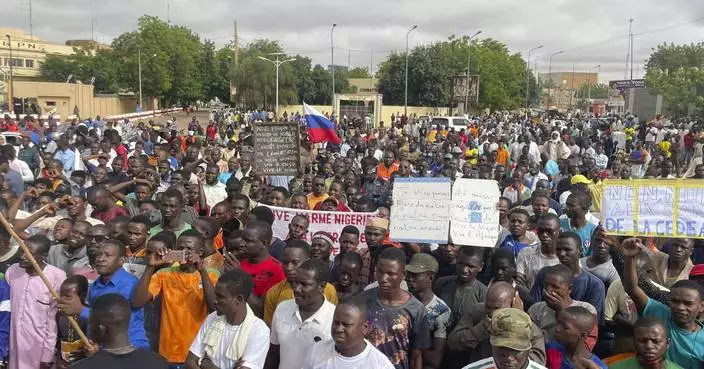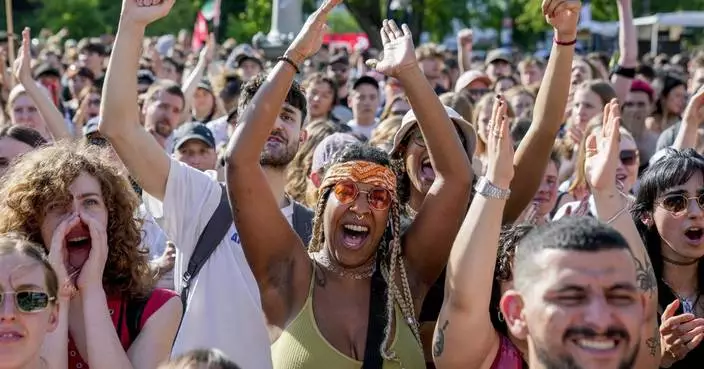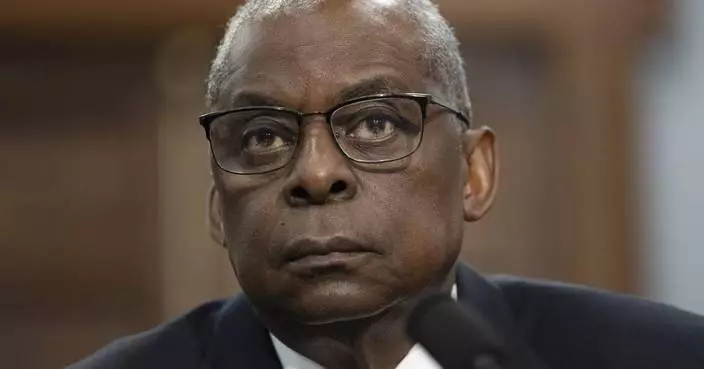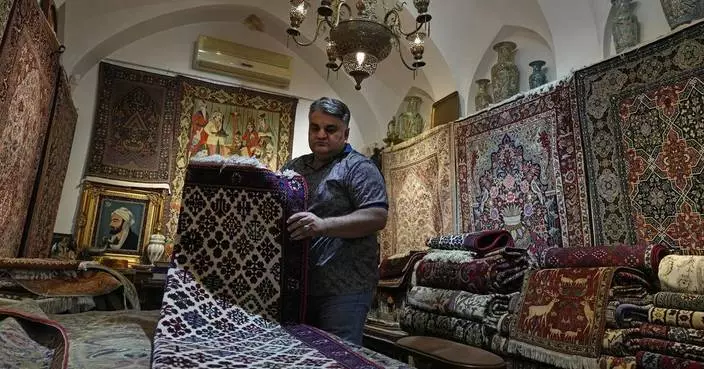The Starz drama "Vida" returns for its second season on Sunday with an even deeper exploration of an issue facing many U.S. Latino communities: gentrification.
The show follows Emma and Lyn, played Mishel Prada and Melissa Barrera respectively, who have inherited from their late mother an East Los Angeles apartment building and a lesbian bar. Each must come to terms with their lives in the old neighborhood and unresolved issues around love.
The first season ended with the sisters at odds on whether to continue their lives away from East Los Angeles or come back and save a bar that helped shape them.

This image released by Starz shows Melissa Barrera, left, and Mishel Prada from the series "Vida," a drama that follows two Mexican American sisters battling gentrification and the aftermath of their mother’s death. (Kat MarcinowskiStarz via AP)
It remains one of the only television shows featuring a majority U.S. Latina cast.
With its themes around queer love and sex, the show has gained a small but loyal following and drew critical praise for centering its focus on Latina characters and pressures related to gentrification and gente-fication — the phenomenon that middle-class Latinos are working to change a working-class community. (Gente means people in Spanish).
Executive Producer Tanya Saracho said the second season will continue to explore those themes as a backdrop of the overall family drama. "This show is based on what is happening right now" in Latino neighborhoods around the U.S., she said. "All the tactics of protests involving gentrification try to remain authentic."

This image released by Starz shows Melissa Barrera, left, and Mishel Prada from the series "Vida," a drama that follows two Mexican American sisters battling gentrification and the aftermath of their mother’s death. (Kat MarcinowskiStarz via AP)
Currently, tensions are high in the Los Angeles neighborhood of Boyle Heights, where anti-gentrification activists have participated in aggressive protests targeting art galleries by spray painting storefronts and reported death threats. Hispanic activists in Albuquerque's South Valley and Houston's Northside also are speaking out against gentrification efforts they say displaces poor Latinos.
Saracho said she wanted the show to reflect those realities. But Saracho said the second season also wanted to explore gente-fication. The sisters, if they decide to keep the bar, will be in the center of the gente-fication movement and must deal with any backlash, Saracho said.
Prada, starring in her first lead television role, said she's honored to play a strong young Latina who isn't a stereotypical sexy maid or self-entitled millennial. Emma is a lesbian with a high-powered corporate job in Chicago but is working to come to terms with her family's history — a rare character on television.
"You can see her trying to go back and face her demons," Prada said. "It's a scary place for a lot of people but also a brave place."
Lyn, played by the Mexican-born former telenovela actress Barrera, is straight and always searching for the next party and her next sexual conquest. But Barrera said she, too, must mature in the second season amid pressures on the family to sell the bar to an aggressive developer. She said Lyn is in the middle of experiencing an "awakening" that will transfer her character.
"She's coming to terms with the horrible person she was," Barrera said. "I think in season two we get to explore her and see how she became who she is and how she wants to make her sister proud."
Barrera said she finds it empowering how both sisters control their sexuality and that the show refuses to shy away from lesbian love. "It's powerful to see queer bodies like this," Barrera said.
Prada said she's been blown away by how the production has hired female directors, writers and crew. She hopes this leads to a transformative movement in television.
"You start looking around and see that it's possible," Prada said. "And why not?"
Russell Contreras is a member of The Associated Press' race and ethnicity team. Follow him on Twitter at http://twitter.com/russcontreras .
WASHINGTON (AP) — Israel this week briefed Biden administration officials on a plan to evacuate Palestinian civilians ahead of a potential operation in the southern Gaza city of Rafah aimed at rooting out Hamas militants, according to U.S. officials familiar with the talks.
The officials, who were not authorized to comment publicly and requested anonymity to speak about the sensitive exchange, said that the plan detailed by the Israelis did not change the U.S. administration’s view that moving forward with an operation in Rafah would put too many innocent Palestinian civilians at risk.
Israeli Prime Minister Benjamin Netanyahu has vowed to carry out a military operation in Rafah despite warnings from President Joe Biden and other western officials that doing so would result in more civilian deaths and worsen an already dire humanitarian crisis.
The Biden administration has said there could be consequences for Israel should it move forward with the operation without a credible plan to safeguard civilians.
“Absent such a plan, we can’t support a major military operation going into Rafah because the damage it would do is beyond what’s acceptable,” U.S. Secretary of State Antony Blinken said late Friday at the Sedona Forum, an event in Arizona hosted by the McCain Institute.
Some 1.5 million Palestinians have sheltered in the southern Gaza city as the territory has been ravaged by the war that began on Oct. 7 after Hamas militants attacked Israel, killing 1,200 people and taking about 250 hostages.
The United Nations humanitarian aid agency on Friday said that hundreds of thousands of people would be “at imminent risk of death” if Israel moves forward with the Rafah assault. The border city is a critical entry point for humanitarian aid and is filled with displaced Palestinians, many in densely packed tent camps.
The officials added that the evacuation plan that the Israelis briefed was not finalized and both sides agreed to keep discussing the matter.
White House press secretary Karine Jean-Pierre told reporters on Friday that no “comprehensive” plan for a potential Rafah operation has been revealed by the Israelis to the White House. The operation, however, has been discussed during recent calls between Biden and Netanyahu as well as during recent virtual talks with top Israeli and U.S. national security officials.
“We want to make sure that those conversations continue because it is important to protect those Palestinian lives — those innocent lives,” Jean-Pierre said.
The revelation of Israel's continued push to carry out a Rafah operation came as CIA director William Burns arrived Friday in Egypt, where negotiators are trying to seal a cease-fire accord between Israel and Hamas.
Hamas is considering the latest proposal for a cease-fire and hostage release put forward by U.S., Egyptian and Qatari mediators, who are looking to avert the Rafah operation.
They have publicly pressed Hamas to accept the terms of the deal that would lead to an extended cease-fire and an exchange of Israeli hostages taken captive on Oct. 7 and Palestinian prisoners in Israeli jails.
Hamas has said it will send a delegation to Cairo in the coming days for further discussions on the offer, though it has not specified when.
Israel, and its allies, have sought to increase pressure on Hamas on the hostage negotiation. Signaling that Israel continues to move forward with its planning for a Rafah operation could be a tactic to nudge the militants to finalize the deal.
Netanyahu said earlier this week that Israeli forces would enter Rafah, which Israel says is Hamas’ last stronghold, regardless of whether a truce-for-hostages deal is struck. His comments appeared to be meant to appease his nationalist governing partners, and it was not clear whether they would have any bearing on any emerging deal with Hamas.
Blinken visited the region, including Israel, this week and called the latest proposal “extraordinarily generous” and said “the time to act is now.”
In Arizona on Friday, Blinken repeated remarks he made earlier this week that "the only thing standing between the people of Gaza and a cease-fire is Hamas.”
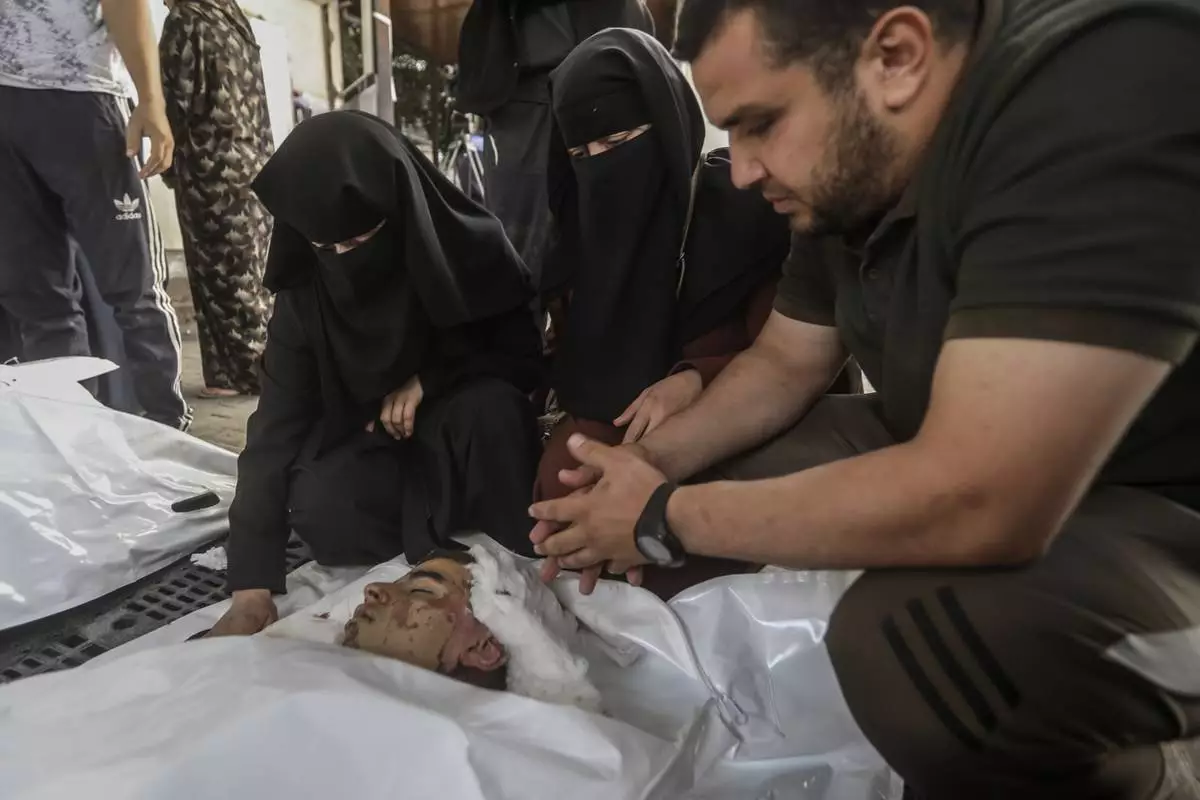
The Chahine family prepares to bury two adults and five boys and girls under the age of 16 after an overnight Israeli strike in Rafah, southern Gaza Strip, Friday, May 3, 2024. An Israeli strike on the city of Rafah on the southern edge of the Gaza Strip killed several people, including children, hospital officials said Friday. (AP Photo/Ismael Abu Dayyah)
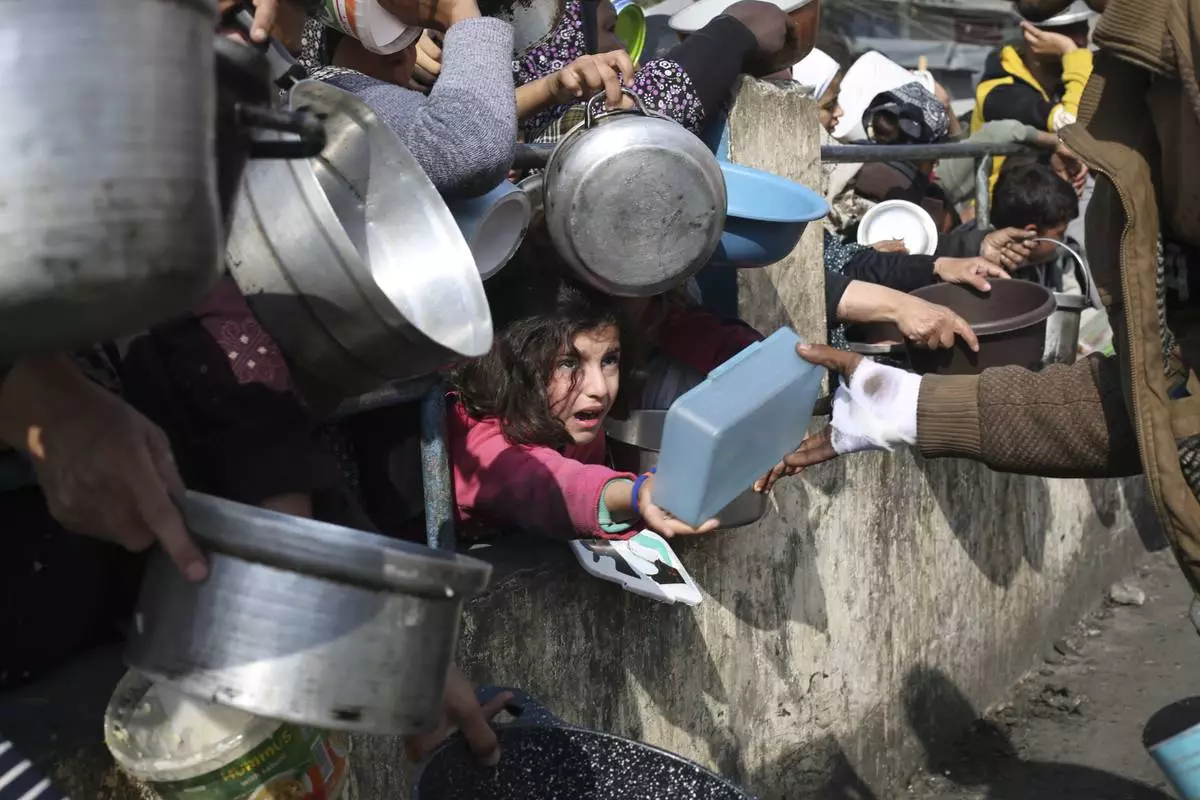
FILE - Palestinians line up for free food during the ongoing Israeli air and ground offensive on the Gaza Strip in Rafah, Jan. 9, 2024. A top U.N. official said Friday, May 3, 2024, that hard-hit northern Gaza was now in “full-blown famine" after more than six months of war between Israel and Hamas and severe Israeli restrictions on food deliveries to the Palestinian territory. (AP Photo/Hatem Ali, File)

Palestinians rescue a woman survived after the Israeli bombardment on a residential building of Abu Alenan family in Rafah, southern Gaza Strip, early Saturday, May 4, 2024. (AP Photo/Ismael Abu Dayyah)

President Joe Biden walks across the South Lawn of the White House as he talks with White House press secretary Karine Jean-Pierre Thursday, May 2, 2024, in Washington, after returning from a trip to North Carolina. (AP Photo/Mark Schiefelbein)










